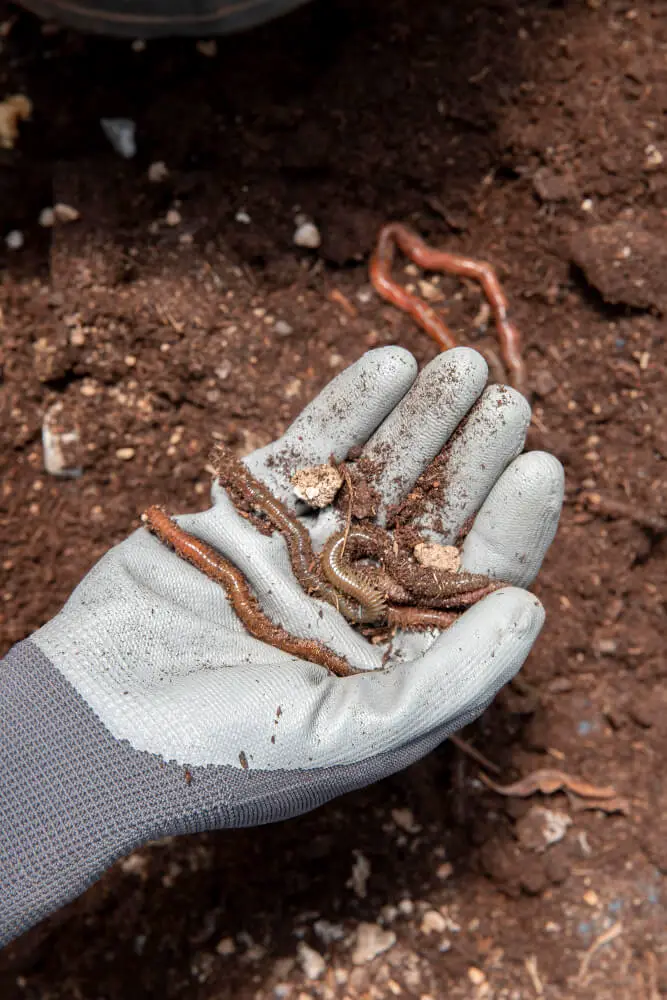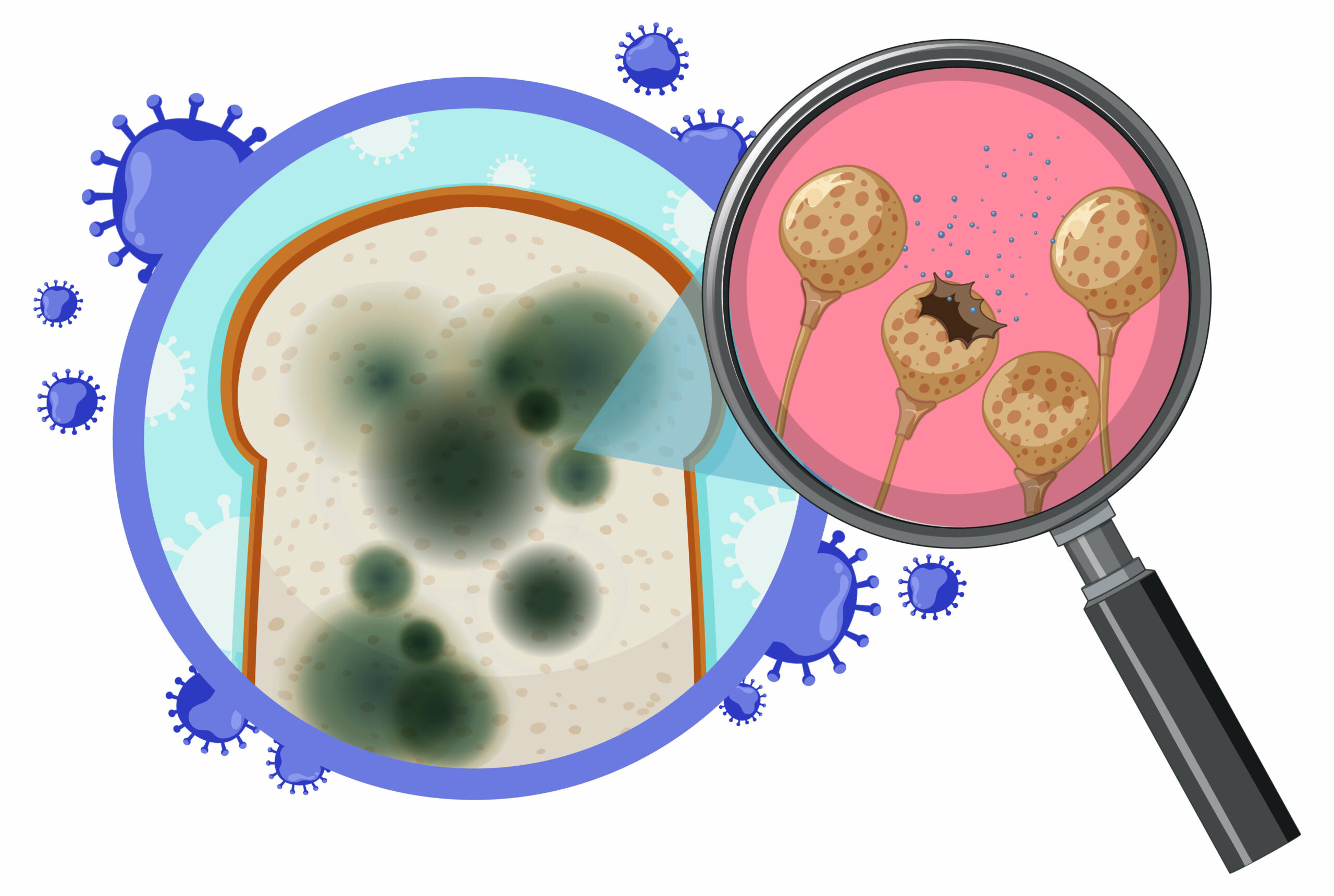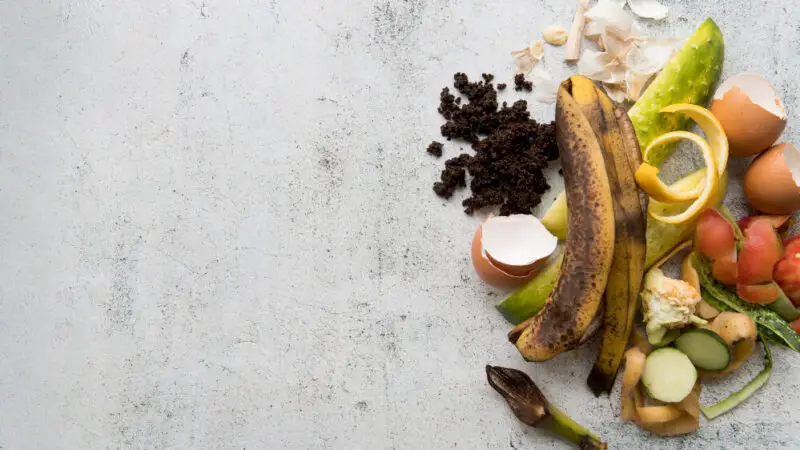Detritus consists of dead organic matter, while decomposers are organisms that break down detritus into simpler substances, facilitating nutrient recycling.
When it comes to understanding ecosystems, two terms that often come up are “detritus” and “decomposers.” While both play significant roles, they are not interchangeable. Let’s explore the difference between detritus and decomposers.
Key Takeaways:
- Detritus refers to dead or decaying organic matter.
- Decomposers are organisms responsible for breaking down detritus.
- Detritivores are a type of decomposer that physically ingest detritus.
- Decomposers, like bacteria and fungi, decompose material externally.
- Understanding these differences is crucial to grasp ecosystem breakdown and nutrient cycling.
What are Decomposers?

Decomposers, such as bacteria and fungi, are organisms that play a vital role in ecosystems by decomposing dead or decaying organic matter. They break down complex organic compounds into simpler substances, releasing nutrients back into the environment. This process is known as organic matter decomposition and is essential for nutrient cycling and the overall breakdown of organic matter.
Decomposers are crucial in maintaining the balance and health of an ecosystem. Without them, organic matter would accumulate, resulting in a buildup of waste and a decrease in nutrient availability. By decomposing organic matter, decomposers release essential nutrients, such as carbon, nitrogen, and phosphorus, back into the ecosystem, making them available for other organisms to utilize.
To better understand the role of decomposers, let’s take a look at a table showcasing some common decomposers and their contributions:
| Decomposer | Role |
|---|---|
| Bacteria | Break down organic matter |
| Fungi | Decompose complex compounds |
What are Detritivores?
Detritivores are an essential type of decomposer that play a crucial role in the ecosystem by consuming decaying organic matter. Unlike other decomposers, detritivores physically ingest the detritus and break it down internally, contributing to the decomposition process and the release of nutrients back into the ecosystem.
The Role of Detritivores
Detritivores are particularly important in the breakdown of dead plant and animal material, such as leaves, wood, and carcasses. By consuming detritus, detritivores aid in the decomposition process, accelerating the breakdown of organic matter and facilitating nutrient recycling.
Detritivores enhance the cycling of essential nutrients, such as nitrogen and phosphorus, by breaking down complex organic compounds into simpler forms that can be absorbed by other organisms. Through their feeding activities, detritivores convert detritus into organic materials that are readily available for uptake by plants and other primary producers.
Furthermore, detritivores play a significant role in maintaining the balance within ecosystems. By consuming and breaking down detritus, they help prevent the accumulation of organic matter, which could otherwise lead to imbalances in nutrient availability and the overall health of the ecosystem.
Detritus Consumption Process
Detritivores consume detritus through their specialized feeding mechanisms. For example, earthworms ingest soil and organic debris, passing it through their digestive tract where it is broken down by enzymes and bacteria. Woodlice consume decaying plant matter, while millipedes feed on leaf litter and carcasses. Each detritivore species has its own unique adaptations for consuming specific types of detritus.
The detritus consumed by detritivores provides them with energy and essential nutrients needed for growth and reproduction. As detritivores break down the organic matter internally, they contribute to the decomposition process and facilitate the release of nutrients back into the environment.
| Examples of Detritivores |
|---|
| Earthworms |
| Woodlice |
| Millipedes |
| Snails |
| Slugs |
Detritivores fulfill a vital ecological role by contributing to the decomposition and nutrient cycling processes within ecosystems. Their activities help maintain the overall balance and health of the environment by promoting the efficient breakdown of organic matter and the recycling of essential nutrients.
Role of Detritus in Ecosystems
Detritus plays a crucial role in ecosystems as it acts as the foundation for the breakdown of organic matter and facilitates nutrient cycling. It provides a source of energy and nutrients for decomposers and detritivores, ensuring the continuous flow of essential elements within the ecosystem.
When organic matter, such as dead plants and animals, decomposes, it transforms into detritus. This detritus is then consumed by detritivores, including insects, worms, and crustaceans, who physically ingest and break down the organic matter internally. Through their feeding activities, detritivores accelerate the decomposition process and release valuable nutrients back into the environment.
Moreover, detritus acts as a primary food source for many decomposers, such as bacteria and fungi. These microscopic organisms break down the detritus into simpler substances through chemical processes, further aiding in the decomposition of organic matter. This breakdown releases nutrients, such as carbon, nitrogen, and phosphorus, which are essential for the growth and survival of other organisms in the ecosystem.
The role of detritus in ecosystem functioning cannot be understated. Without detritus, the organic matter would accumulate and impede the ecosystem’s ability to recycle nutrients, leading to the breakdown of essential ecological processes. Detritus serves as a vital link in the nutrient cycle and supports the overall health and balance of the ecosystem.
The Role of Detritus in Ecosystems:
- Detritus provides a source of energy and nutrients for decomposers and detritivores.
- Detritivores physically ingest and break down detritus, accelerating the decomposition process.
- Decomposers, such as bacteria and fungi, break down detritus chemically, releasing essential nutrients.
- Detritus is a crucial component of nutrient cycling in ecosystems.
- Without detritus, the ecosystem’s ability to recycle nutrients would be significantly impaired, leading to ecosystem breakdown.
Examples of Detritivores and Decomposers
Detritivores and decomposers are vital organisms that contribute to the decomposition and recycling of organic matter in various ecosystems. Let’s take a closer look at some examples of detritivores and decomposers:
Detritivores
Detritivores are creatures that consume decaying organic matter, playing a crucial role in the breakdown process. Here are a few examples of detritivores:
- Worms
- Millipedes
- Woodlice
- Slugs
- Dung flies
- Sea stars
- Crabs
- Sea cucumbers
Decomposers

Bacteria and fungi are examples of decomposers. These microorganisms have the capability to break down detritus and organic matter. They play a crucial role in nutrient recycling and are vital components of ecosystems.
Now that we have explored some examples of detritivores and decomposers, let’s dive deeper into their roles and the importance of their contributions.
| Examples of Detritivores | Examples of Decomposers |
|---|---|
| Worms | Bacteria |
| Millipedes | Fungi |
| Woodlice | |
| Slugs | |
| Dung flies | |
| Sea stars | |
| Crabs | |
| Sea cucumbers |
Similarities between Detritivores and Decomposers
While detritivores and decomposers have distinct functions, they share some similarities. Understanding these similarities helps us grasp their essential roles in ecosystems.
Heterotrophs
Both detritivores and decomposers are heterotrophs. This means they rely on obtaining energy and nutrients from organic matter produced by other organisms. Detritivores consume decaying organic matter directly, while decomposers break down complex organic compounds into simpler substances.
Decomposition and Recycling
Detritivores and decomposers actively participate in the decomposition and recycling of organic matter. They play crucial roles in breaking down dead or decaying organic material into simpler forms, releasing nutrients back into the ecosystem. This nutrient recycling process promotes the sustainability and balance of ecosystems.
Trophic Position
Detritivores and decomposers occupy lower trophic levels within food chains. They function as primary consumers, feeding on detritus and decomposing organic matter. Their position in the trophic hierarchy ensures the efficient transfer of energy and nutrients from organic matter to higher trophic levels within the ecosystem.
Nutrient Cycling
Both detritivores and decomposers contribute to nutrient cycling within ecosystems. As they break down organic matter, they release essential nutrients such as carbon, nitrogen, and phosphorus, which are crucial for the growth and development of other organisms. This cycling of nutrients ensures the availability of resources for various components of the ecosystem.
By examining these similarities, we can appreciate the important roles detritivores and decomposers play in maintaining the health and functioning of ecosystems.
| Similarities | Detritivores | Decomposers |
|---|---|---|
| Heterotrophs | Consume decaying organic matter directly | Break down complex organic compounds |
| Decomposition and Recycling | Aid in the breakdown of dead organic matter | Convert organic matter into simpler substances |
| Trophic Position | Primary consumers of detritus | Occupies a lower trophic level |
| Nutrient Cycling | Release nutrients back into the ecosystem | Contribute to the availability of essential nutrients |
Detritivores vs Decomposers: Key Differences
In ecosystems, detritus and decomposers play crucial roles in the breakdown of organic matter. However, they have distinct characteristics and functions. Detritus refers to the organic matter itself, while decomposers are the organisms responsible for breaking down this matter.
Detritivores, a type of decomposer, are organisms that consume decaying organic matter. They physically ingest the detritus and break it down internally. This process aids in the decomposition of organic matter and helps release nutrients back into the ecosystem.
On the other hand, other decomposers, such as bacteria and fungi, decompose organic material externally. They secrete enzymes that break down the detritus into simpler substances, facilitating the release of nutrients into the ecosystem.
Detritivores vs Other Decomposers: a Comparison
| Aspect | Detritivores | Other Decomposers |
|---|---|---|
| Definition | Organisms that physically consume decaying organic matter | Organisms that decompose organic material externally |
| Role | Aid in the decomposition of organic matter | Break down organic matter externally and release nutrients |
| Examples | Worms, millipedes, woodlice | Bacteria, fungi |
Above table showcases the key differences between detritivores and other decomposers.
While detritus and decomposers are both essential for nutrient cycling and ecosystem health, understanding their differences is vital to grasp the intricate processes that occur in the environment.
Mode of Nutrition: Internal vs External Digestion
Detritivores and other decomposers have different modes of nutrition that contribute to the breakdown and recycling of organic matter. Detritivores engage in *internal digestion*, where they consume decaying organic matter and break it down internally to obtain nutrients. On the other hand, other decomposers, such as bacteria and fungi, practice *external digestion*. They secrete enzymes to break down organic matter externally and then absorb the resulting nutrients.
This contrast in digestion methods between detritivores and other decomposers plays a significant role in the efficiency of nutrient recycling within ecosystems. Let’s take a closer look at the two modes of nutrition:
Internal Digestion
Detritivores, such as earthworms and woodlice, feed on decomposing organic matter directly. They have specialized digestive systems that allow them to break down complex organic compounds internally.
Here’s an example of how internal digestion works:
- A detritivore consumes decaying organic matter, such as fallen leaves or dead plant material.
- The organic matter enters the detritivore’s digestive system, where it is broken down by enzymes and gut bacteria.
- Nutrients, such as carbon, nitrogen, and phosphorus, are absorbed by the detritivore’s body and used for energy and growth.
- The remains, known as feces or frass, are expelled from the detritivore’s body.
This internal digestion process allows detritivores to extract valuable nutrients from decaying organic matter, contributing to the nutrient cycling and overall ecosystem function.
External Digestion
Unlike detritivores, other decomposers, like bacteria and fungi, practice *external digestion*. They secrete enzymes into their surrounding environment to break down complex organic compounds, such as dead plants or animal remains.
Here’s how external digestion occurs:
- Bacteria and fungi release enzymes that break down the complex organic compounds of decaying matter into simpler substances.
- These enzymes act externally, meaning they are secreted outside the decomposers’ cells.
- The decomposers then absorb the broken-down nutrients through their cell walls.
- The absorbed nutrients are used by the decomposers for energy and growth.
This external digestion process enables bacteria and fungi to break down organic matter efficiently and recycle essential nutrients back into the ecosystem.
By employing different modes of nutrition, detritivores and other decomposers play integral roles in the breakdown and recycling of organic matter within ecosystems. This process ensures that nutrients are continuously cycled and made available to other organisms. Now that we understand the distinct digestion methods, let’s explore the importance of detritivores and decomposers in maintaining the balance of ecosystems.
Importance of Detritivores and Decomposers in Ecosystems
Detritivores and decomposers play vital roles in ecosystems, contributing to the health and sustainability of the environment. They are responsible for the decomposition and breakdown of organic matter, which is essential for nutrient recycling and the maintenance of nutrient cycles.
Without detritivores and decomposers, organic matter would accumulate and hinder the ecosystem’s ability to sustain itself. These organisms efficiently break down dead or decaying material, releasing nutrients back into the ecosystem and making them available for other organisms to use. This process is crucial for the continuous flow of energy and nutrients within the ecosystem.
One of the key roles of detritivores and decomposers is nutrient recycling. They break down complex organic compounds present in detritus into simpler substances. As a result, important elements such as carbon, nitrogen, and phosphorus are released and become available for uptake by plants and other organisms. This nutrient recycling process ensures the availability of essential nutrients for the growth and survival of all organisms in the ecosystem.
Moreover, detritivores and decomposers help maintain the balance of the ecosystem by preventing the accumulation of organic waste. If detritus were left unprocessed, it would clutter the environment and hinder the efficient functioning of the ecosystem. Detritivores, such as worms and millipedes, physically consume detritus, while decomposers like bacteria and fungi break down organic matter externally through enzyme secretion.
To further illustrate the importance of detritivores and decomposers, consider the following table:
| Importance of Detritivores | Importance of Decomposers |
|---|---|
| Effective breakdown of detritus | Externally decompose organic matter |
| Facilitate nutrient recycling | Release nutrients back into the ecosystem |
| Prevent organic waste accumulation | Enable proper ecosystem functioning |
| Enhance soil fertility | Aid in the breakdown of complex compounds |
As seen in the table above, both detritivores and decomposers have distinct roles in the ecosystem, but their combined efforts contribute to the overall health and sustainability of the environment. By breaking down detritus and releasing nutrients, they play a crucial role in maintaining nutrient cycles and supporting the growth of plants and other organisms.
Conclusion
In conclusion, detritus and decomposers play vital roles in ecosystems, contributing to the breakdown and recycling of organic matter. Detritus, which refers to dead or decaying organic material, serves as the foundation for the ecosystem’s nutrient cycling processes. On the other hand, decomposers, including detritivores, bacteria, and fungi, are responsible for breaking down this detritus.
By understanding the distinction between detritus and decomposers, we gain insight into how ecosystems function and maintain their balance. Detritus provides a source of energy and nutrients, while decomposers act as the agents that facilitate the decomposition process. This breakdown of organic matter allows for the release of nutrients back into the ecosystem, ensuring the sustenance of other organisms.
Ultimately, the interplay between detritus and decomposers is essential for the overall health and stability of ecosystems. It is through their combined efforts that the organic detritus is transformed into usable nutrients, supporting the growth and survival of various organisms within the ecosystem. By appreciating the significance of detritus and decomposers, we can better appreciate the intricate and interconnected web of life that exists in our natural world.
FAQ
What is the difference between detritus and decomposers?
Detritus refers to the organic matter that is dead or decaying, while decomposers are organisms responsible for breaking down this matter.
What are decomposers?
Decomposers are organisms, such as bacteria and fungi, that decompose dead or decaying organic matter, breaking it down into simpler substances and releasing nutrients back into the ecosystem.
What are detritivores?
Detritivores are a type of decomposer that specifically consume decaying organic matter by physically ingesting and breaking it down internally.
What is the role of detritus in ecosystems?
Detritus serves as a source of energy and nutrients for decomposers and detritivores, facilitating the breakdown of organic matter and the recycling of nutrients in the ecosystem.
Can you provide some examples of detritivores and decomposers?
Examples of detritivores include worms, millipedes, woodlice, slugs, dung flies, sea stars, crabs, and sea cucumbers. Examples of decomposers include bacteria and fungi.
What are the similarities between detritivores and decomposers?
Both detritivores and decomposers are heterotrophs that contribute to the breakdown and decomposition of organic matter, occupying lower trophic levels in food chains and aiding in nutrient cycling within ecosystems.
What are the key differences between detritivores and decomposers?
Detritus refers to the organic matter itself, while decomposers are the organisms responsible for breaking down this matter. Detritivores consume decaying organic matter internally, while other decomposers decompose material externally.
What is the mode of nutrition for detritivores and decomposers?
Detritivores engage in internal digestion, consuming and breaking down decaying organic matter internally. Other decomposers, such as bacteria and fungi, practice external digestion, where they secrete enzymes to break down organic matter externally and then absorb the resulting nutrients.
How important are detritivores and decomposers in ecosystems?
Detritivores and decomposers play vital roles in ecosystems by facilitating the decomposition and breakdown of organic matter, allowing for nutrient recycling and the maintenance of nutrient cycles. Without these organisms, organic matter would accumulate, and the ecosystem’s ability to sustain itself would be compromised.
What are the key takeaways about detritus and decomposers?
Detritus refers to dead or decaying organic matter, while decomposers are organisms responsible for breaking down this matter. Detritivores are a type of decomposer that consumes decaying organic matter internally. Detritus and decomposers play crucial roles in ecosystem breakdown and nutrient cycling processes.
Source Links
- https://www.differencebetween.com/difference-between-decomposer-and-vs-detritivore/
- https://biologydictionary.net/difference-detritivores-decomposers/
- https://pediaa.com/difference-between-detritivores-and-decomposers/
Image Credits
Featured Image By – Freepik
Image 1 By – Freepik
Image 2 By – brgfx on Freepik








